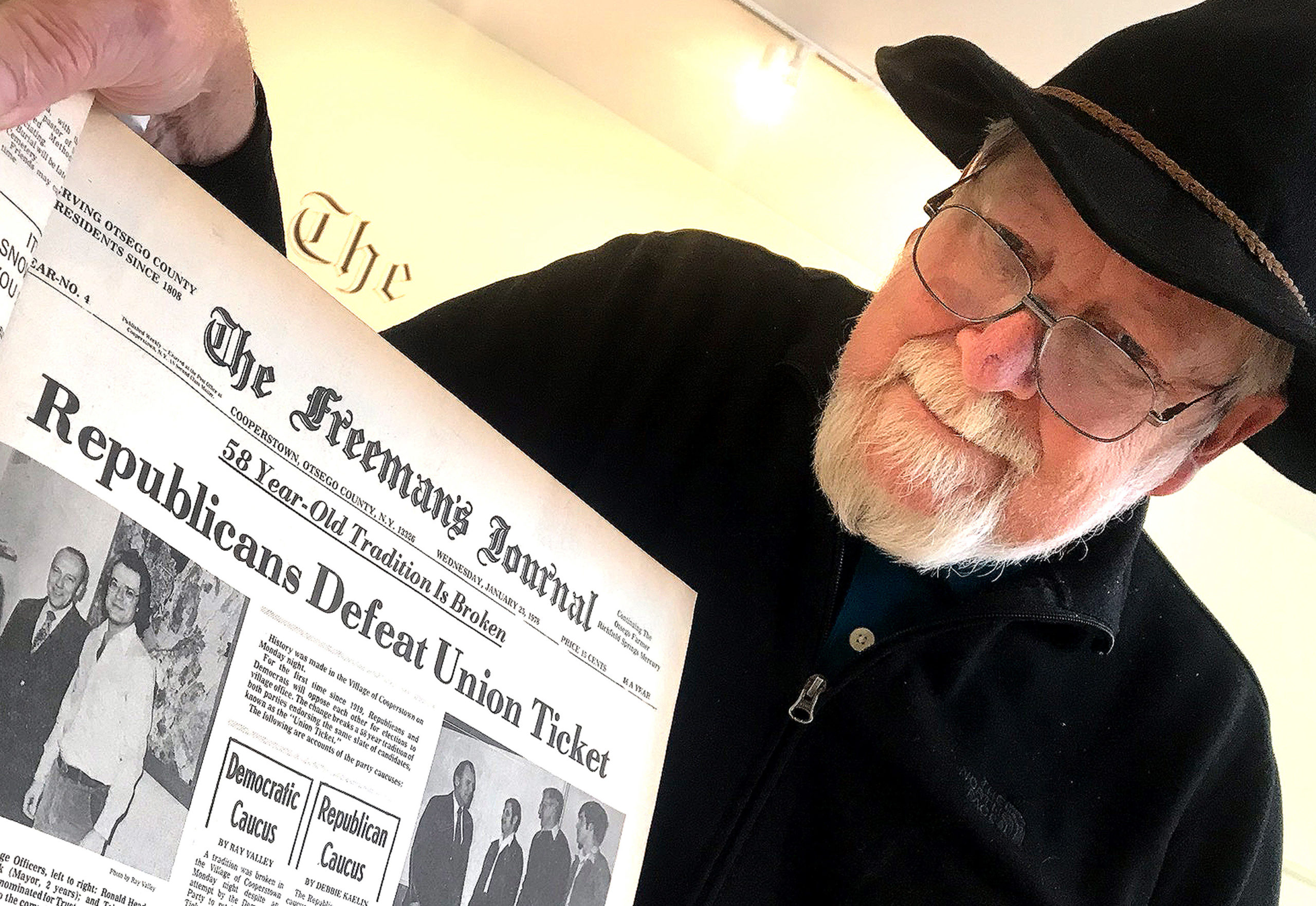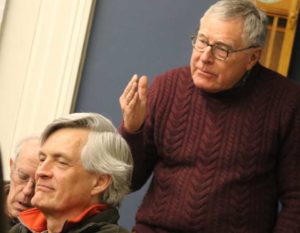TRADITION RECALLED A DEBATE
Then A Newcomer,
Waller Helped End
Union-Ticket Idea

By JIM KEVLIN • Special to www.AllOTSEGO.com
COOPERSTOWN – It’s been 42 years, but the idea of the “Union Ticket,” and the community amity it suggests, lives on.
It was the subject of a lively debate last Thursday, March 5, at the League of Women Voters’ Candidate Night – three candidates are running for two trustee seats.

Early in the evening, Dr. Roger MacMillan, the retired Bassett physician, asked the panel’s opinion on the Union Ticket, adding, “It was wonderful.”
While saying Village Board decisions should be decided in a non-partisan way, Trustee candidate Joe Membrino said, “I’m a supporter of two parties. Parties are formed around ideas and ideals.” The other Democratic incumbent, MacGuire Benton agreed.
Said Republican candidate Mary Margaret Robbins Sohns, “We have to come together and work together.”
Listening in the audience was Bill Waller, husband of Carol B. Waller, whose mayoralty, he said in an interview the following day, grew out of the end of the Union Ticket.
And he claimed some authorship. The Wallers moved up from Long Island to Cooperstown in 1971, when her dad, future county Rep. Charlie Bateman, bought Mohican Flowers.
Six years later, at the invitation of Tom Malone, then owner of The Pratt Hotel, Bill Waller attended an annual Republican caucus, and was disappointed that only seven people showed up.
It was explained to him that, under the Union Ticket arrangement, village Republicans would name the mayoral candidate one year, then two years later the Democrats would do so. If there were two trustee positions open, the GOP would name one trustee; the Democrats, the other.
The system had been in effect since 1920.
“I believed the best thing was to get people who wanted the position, rather than people who were appointed to the position,” Waller said. “The best way to get people who wanted the position was for them to campaign for it.”
He brought Malone over to his point of view.
Malone then hosted a meeting of a dozen like-minded Republicans at his Susquehanna Avenue home, and over the next several months they wrote a platform, built a phone bank to get out the party faithful, and generally organized the party to contest elections.
“The first of December,” he recalled, “we began a campaign to get people to attend the caucus. We called people up. We talked to them on the street.”
Malone’s Pratt was the Republican gathering place. The Pioneer Grill (now Cooley’s) was the Democratic hangout.
“At the time,” Waller said, “the Republicans were branded as the progressives. We were breaking with the conservatives.”
It all came to a head on Monday, Jan. 23, 1978, when both parties scheduled their caucuses, according to that week’s Freeman’s Journal.
From seven the year before, 54 Republicans gathered in the third-floor ballroom, and a lively debate ensued. The newspaper quoted Robert Daly declaring, “Good government is decided by opposition.
Alva Welch made the motion to withdraw from the Union Ticket. Dr. Emery Hermann seconded it. The vote was 27-20, passing the motion. The news was carried downstairs to the Democrats, who were still considering a similar motion.
That was “unfair to this caucus,” declared the village Democratic chairman, Stu Taugher. “Please vote as you would have voted before.”
The Democratic tally was 16-12 in favor of the status quo. But the Union Ticket, which required both parties to agree, was dead.
“I hate to see 58 years of excellent history go down in one strike,” lamented Taugher. “I don’t believe the new system will be a success.”
The Republicans the nominated Bill Zoeller for mayor, and William Ronk and Jim Brophy as trustees.
The Democrats nominated former mayor Gerry Clark for another term. Arnold Staffin and Toby Tighe were nominated for trustee. That March, the Democratic slate was elected.
“We lost for the first few years,” said Waller. “A lot of dyed-in-the-wool Republicans were very upset we didn’t win. We’d come up with a strategy and didn’t win.”
Still, he said, “the end result: They got more people involved with the selection of who wanted to run. It made the candidates articulate their positions, rather than just be appointed.”
And things started to change. “I think we elected a trustee first,” Waller said. “Then we took control of the board.” Republicans supported the first female trustee, Dutchie Lewis.
And, in 2000, Carol – Bill’s wife – ran for mayor as a Republican, and won. “That solidified it,” Waller said.

